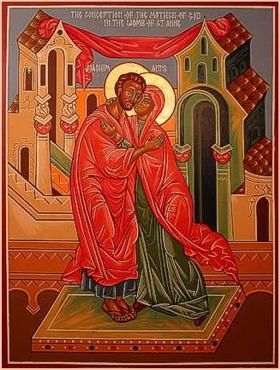
George Weigel, John Paul the Great’s official biographer and a prominent Catholic thinker on his own account, once remarked that the late pope’s theology of the body is a “theological time-bomb set to go off” in the Church. Yet so far I hear only muffled, intermittent ticking. If Catholics—and for that matter, Christians in general—are to start appreciating the true basis and beauty of the Church’s ancient teaching about human sexuality, the bomb must be set off. And such appreciation is long overdue in an era when Christians, by and large, are less disposed than ever to live by such teaching. In my opinion, that is one of the major obstacles to effective evangelization in the world today. We need to re-evangelize ourselves in this area at least as much as any other. As far as I’ve seen, the theology of the body is the only way on offer.
I started this blog a few months ago largely to provide a convenient medium for developing my thoughts and garnering feedback on this very topic. That I have received no feedback thereon is mostly my own fault; my largest entry, which consists of the first half of an article on the topic I was writing for publication, has long since got buried in archive and I haven’t even reached the punch line yet. But that little experience, I’m afraid, is all too typical of the larger Catholic experience over the generation since Karol Wojtyla first propounded TOB at length in his teaching capacity as pope. Throughout the Catholic world, only a minority seem even to be aware of said theology, and fewer still take the trouble to absorb it. I used to think that was due to poor publicity, which left unmarked its great depth, beauty, and creativity. But I now believe the relative silence is explained largely by those very qualities. Coming to terms with the theology of the body would take most Catholics too far from their comfort zone, in which adult religious education is considered a leisure activity for the few and the Church’s moral strictures about sex are often compromised when not ignored. That needs to change. What can be done to change it?
Part of it is simply the dog-work of getting the message out. The message is not hard to put succinctly and attractively. Thus:
The Pope’s thesis, if we let it sink in, is sure to revolutionize our understanding of the human body, sexuality and, in turn, marriage and family life. “The body, and it alone,” John Paul says, “is capable of making visible what is invisible, the spiritual and divine. It was created to transfer into the visible reality of the world, the invisible mystery hidden in God from time immemorial, and thus to be a sign of it” (February 20, 1980).That’s from America’s leading popularizer of the theology of the body, Christopher West. It just scratches the surface, but it presents a surface well worth getting beneath. The only people I’ve encountered who actively dislike the theology of the body are Catholic theologians who have long opposed the Magisterium for reasons of their own; almost everybody else to whom I’ve shown it approves it. Some are even excited by it.
A mouthful of scholarly verbiage, I know. What does it mean? As physical, bodily creatures we cannot see God. He’s pure Spirit. But God wanted to make His mystery visible to us, so He stamped it into our bodies by creating us as male and female in His own image (cf. Gen. 1:27).
The function of this image is to reflect the Trinity, “an inscrutable divine communion of [three] Persons” (November 14, 1979). John Paul thus concludes that “man became the ‘image and likeness’ of God not only through his own humanity, but also through the communion of persons which man and woman form right from the beginning.” And, the Pope adds, “on all of this, right from ‘the beginning,’ there descended the blessing of fertility linked with human procreation” (ibid.).
The body has a “nuptial meaning” because it reveals man and woman’s call to become a gift for one another, a gift fully realized in their “one flesh” union. The body also has a “generative meaning,” which (God willing) brings a “third” into the world through the couple’s communion. In this way, marriage constitutes a “primordial sacrament” understood as a sign that truly communicates the mystery of God’s Trinitarian life and love to husband and wife, and through them to their children, and through the family to the whole world.
This is what marital spirituality is all about: participating in God’s life and love and sharing it with the world. While this is certainly a sublime calling, it’s not ethereal. It’s tangible. God’s love is meant to be lived and felt in daily life as a married couple and as a family. How? By living according to the full truth of the body.
Many are not excited because they see little reason to immerse themselves in what strikes them as another lengthy, head-hurting theological case for avoiding what they like. But for people whose souls are larger than that, the theology of the body is peerless as a place to begin reinvigorating their understanding of what the gift of sexuality is really about. Healthy theologians can and do appreciate it as a way of incorporating the Catholic Church’s traditional natural-law approach to sexual questions into the overarching personalism of biblical revelation. I invite readers to study the theology of the body and register reactions once they have done so. Those already familiar with it, if any, would be of great help.
The above is a slightly edited version of a piece I posted at Pontifications.



























